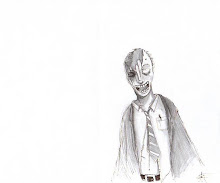
This Friday, Mira and I took a nice day trip out to Philadelphia. We were excited to see the puppets in contemporary art exhibition curated by my friend Carin Kuoni and Ingrid Schaffner. We had a wonderful drive down listening to Democracy Now. The focus of the show was that the 911 Commission's report apparently has a fourth of its footnotes obtained possibly through torture. They interviewed the director of the commission, Philip Zelikow, whose flipflopping and inconsistent (bordering on bizarre) defense made it clear that he was completely caught off guard by these allegations. "Hey don't look at me, the CIA did the torturing!", he seemed to be saying. In short, the 911 commission was aware that the CIA was probably torturing the detainees who were providing the information but didn't really want to know. They just wanted the information. More appauling than anything is that after explaining that the commission was actually concerned about how the information they were using was obtained, they asked the CIA to go back and get more information out of the detainees (obviously via torture). This absolute disregard for human rights on all levels of government makes you realize the depths of the 911 mania was taken (and still is). Now the CIA is under fire and everyone that went along with it is taking the Eichman defense ie. I was just doing my job.
Can you imagine the 911 Commission school of journalism? In the 911 commission school, if you are lacking some facts or information, you just go out and find those involved (or for that matter, someone nearby) torture them till they give you a good story, then put it in the footnote. PS. We made our source feel like he was drowning and when we came up for air he spun an incredible yarn, see footnote 7. My college papers could have looked so different with the 911 footnote via torture method. In fact, with footnotes as torture could be included as part of the Research for Dummies guide.
In thinking about the fact that the CIA has admitted to waterboarding three detainees, a few argumentative inconsistencies emerge. One is the question of whether one should not use torture for footnotes because, well, under conditions of torture, people don't tell the truth. Now, I don't know the research on this. I am sure there could be empirical research that goes either way, but clearly, it leaves room for doubt. How reliable is this material? The problem, of course, is that this line of reasoning also leaves one vulnerable to a discussion about whether or not information obtained under torture is useful. Given the myopic yet pervasive perspective of most game theory oriented people (otherwise known as a majority of folks in government and military), this question is simple: if a bomb was going to destroy a million people, woudn't it be more reasonable to torture one? This logic makes its way through every ethical issue in civil and national and international law and one must always beware of its corrosive implication. Under this logic, the national paranoia of terrorism becomes the perfect atmosphere for destroying all civil liberties. This has been said a thousand times.
But this is the weekness of focusing on the argument that torture makes the 911 commissions report invalid. Because one can trust testimony under torture. A. No one cares about the accuracy of the report anyway. It was such a bankrupt method from the get-go, why worry about its validity now? That is a losing angle. This basically leaves one open to the game theory logic that makes our rights exploitable. The better one is much more simple: torture is ethically wrong (that is why it is called torture). When we begin to torture people, our rights as citizens lose value. We undermine the basis of law and democracy when we talke the foundations of human rights away.






No comments:
Post a Comment